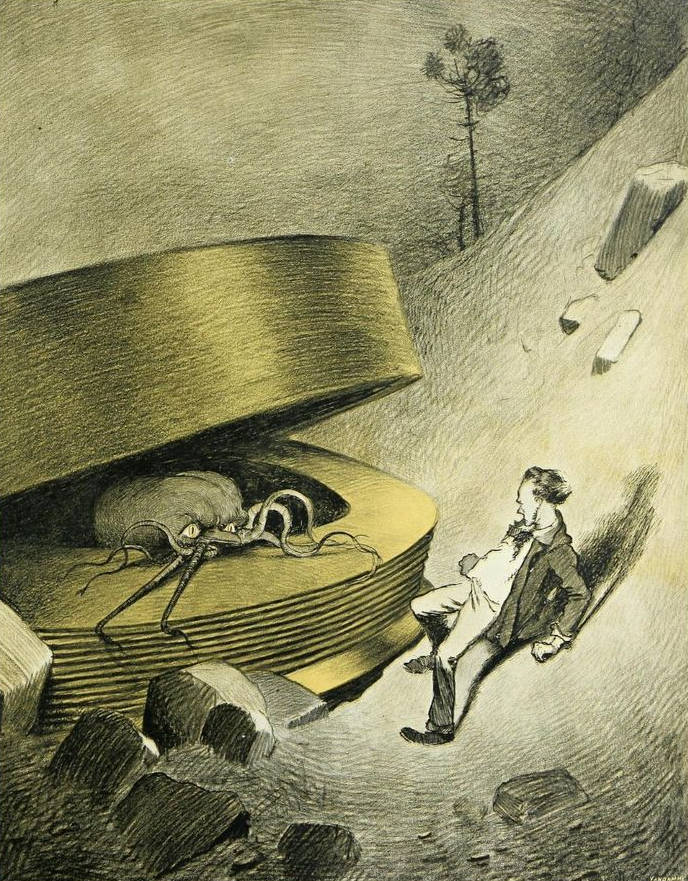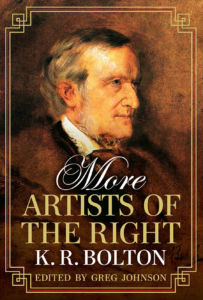“Many Strange & Terrible Days”: Gothic Science Fiction & Modern War, Part 1
Kathryn S.3,882 words
Part 1 of 2 (Part 2 here)
Introduction
It was perhaps the most famous description of a (space) alien in English literature. The narrator felt an “utter terror [grip] him” as a thing from a nightmare emerged slowly, slowly from the pit that its smoking spacecraft had cratered in the Earth. As its body “bulged up and caught the light, it glistened like wet leather.” A pair of huge, fathomless dark eyes regarded him intensely, “steadfastly. The mass that framed them, the head of the thing, was rounded,” and under the eyes was a mouth, “the lipless brim of which quivered and panted, and dropped saliva. The whole creature heaved and pulsated convulsively.” This “incessant quivering . . . the Gorgon groups of tentacles, the tumultuous breathing of the lungs in a strange atmosphere,” and finally, its malevolent gaze — all of these made the creature seem at once “vital . . . crippled and monstrous.” Unless one had seen a Martian in the flesh, the narrator related, there was no way to fully communicate the “horror of its appearance.”[1] Of course, this was H. G. Wells’ iconic rendering of one of the aliens who had come to wipe out humanity in his 1897 novel The War of the Worlds.
But as we all know, science fiction about aliens is never just about aliens — never just about a war between different worlds, but also about the wars of this world. Perhaps more than any other text of its time, Worlds captured the culture of the late-Victorian era, of the changing perceptions of space-time, the flux of modernity, and the unstoppable rise of technology (which the Martians themselves symbolized). Despite Wells’ narrator’s claim that “no one” in the 1890s “would have believed” such a world-shattering catastrophe — an alien world war — was possible, the fact that Wells himself wrote this novel in 1897 shows that clearly, something, or a great many things, had happened by then to make his story resonantly plausible.[2] Worlds brought a century of what I’ll call “Gothic Science Fiction” together and used all its themes to create a uniquely harrowing pulp story that could still frighten people many decades after its publication. It had everything to do with the fact that real wars in the West had become things out of Gothic Science Fiction themselves.
I can hear the questions now. Aren’t Gothic and science-fictional genres opposed; isn’t Gothic Science Fiction an oxymoron, the one about the supernatural and the other about what is supposed to be bound to the consistently empirical? Anyone who has read Mary Shelley (or seen the more recent flowering of the “Steampunk” or Guillermo del Toro aesthetic) knows this is muddy territory. I suggest that the alchemy of the Middle Ages, the electricity of Shelley’s time, and the “hyperspace” of modern times were/are all about mysterious forces only dimly understood by most of their contemporaries; about turning something base — matter or space-time — into gold; about transcending mortal limits, sometimes with hideous results.
And this, readers, might also describe war. There are perhaps persons reading this who have experienced war — as soldiers or as civilians –, whereas I have not. With the humility historians need, I admit that I know that I know about war through the words of others; through reading and listening to them putting into speech that which cannot ultimately be spoken, and can only be understood in a dim and secondhand sort of way. But there is something seductive and immersive in allowing oneself to read and vicariously see the things and think the thoughts belonging to another through primary sources; I’ve always thought so. And what I have learned in my readings and reflections on war is that it has both a horror and appeal that is hard to quench and therefore seems innate to the human spirit.
This is not meant to be a pretty romanticization of war, and I turn to Ernst Jünger here to further clarify what I mean. In words that seemed eerily similar to Wells’, he described the alien landscape of the Western Front and the weird human-inhuman creatures that he saw there: “It was hard to understand” the “horror of [the war’s] appearance.” Nearby his trench,
a young fellow lay on his back, his glazed eyes and his fingers fixed in their last aim. It was a weird sensation to look into those dead and questioning eyes. It gave [him] a shudder that all through the war [Jünger] never quite lost.
Yes, the horrible and nasty were “undoubtedly [part] of that irresistible attraction that drew [his generation] into the war.” An overlong period of lassitude, of “law and order, such as [they] had behind it, produce[d] a real craving for the abnormal, a craving that literature stimulate[d].”[3] There, did Jünger explain the appeal of the awful in life and art. It is this interesting marriage between literature and life that has most fascinated me, and it is this subject of war and the nineteenth-century maturation of Gothic Science Fiction that this essay explores. After some thought, I have decided to focus on three wars that took place within a rough span of half a century, and three characteristics of Gothic Science Fiction that defined them as of a piece.

You can buy James O’Meara’s book Green Nazis in Space! here.
Allow me to “graduate school” this for a moment (but goodness, not overmuch), and answer the question: What is a genre? It is a philosophical-conceptual space, or a classification system organized principally around works of art (these can be pieces of music, literature, film, architecture, as well as the more traditional museum wall-hangings, etc.) and how they form a like and relatively discrete “set”?
In terms of the Gothic Science Fiction “set,” we can say that each of its works is possessed of a disturbed “affective lens” meant to arouse uncomfortable, or anxious, emotions within audience members; to illuminate the characters’ feelings of melodrama or emptiness. A thickened present-time felt causes flurries, or a FRENZY of reactive emotion. Then, there is connected to this the added disturbance of space, the spread of paranoia without, usually in a claustrophobic or pressing environment — a FEVER spread.
Finally, Gothic Science Fiction focuses these space-time affects into a process-of-becoming in which the real fear lies not in death, but in not-death. It mixes up past and future into something hideous; it sees a space alien and recalls the ancient horror of the gorgon. Its images are Cubistic zombies, mad-scientist creations, terraforming, and MUTATION.[4] The horrors are not gone after the aliens die or leave, for the world has been left in a liminal state, and it will only slowly — and perhaps never — fully recover. How many books and films and essays have discussed the American Civil War, the Franco-Prussian War, and the First World War? Countless. But there are always new ways to view and study them — in this case, as quintessentially Gothic Science Fictional masterpieces of destruction.
I. Out of Time: Frenzy
Before the Great Invasion, residents of Woking went about their daily routines as if they had all the time in the world. “No one would have believed in the last years of the nineteenth century that this world was being watched keenly and closely by intelligences greater than man’s.” None would have perceived that as they “busied themselves about their various concerns they were [being] scrutinised and studied, perhaps almost as narrowly” and clinically as a scientist “with a microscope might scrutinise the transient creatures that swarm and multiply in a drop of water.”[5]
Then, it happened.
Bright flashes and streaks of green flame lit up the atmosphere, then crashed to Earth. From inside one of these crafts there crawled a tentacled thing, its lungs convulsing in the strange air. Even in respiratory distress, the Martian stared out at the man with an immense pair of eyes that was of an “extraordinary intensity.” There was something “fungoid in the oily brown skin, something in the . . . tedious movements [that were] unspeakably nasty.” Corpse-like.
After the first encounters with these “visitors,” who had arrived to cleanse and terraform the land, “The early editions of the evening papers” startled all London “with enormous headlines: ‘A MESSAGE RECEIVED FROM MARS.’ ‘REMARKABLE STORY FROM WOKING!’” Meanwhile, telegraphs from “Ogilvy’s wire to the Astronomical Exchange had roused every observatory in the three kingdoms.”[6] A frenzy erupted as mass-mobilized invaders encircled humanity on all sides. Earth, these villains had decided, would be their next colonial victim. Wells’ Martians symbolized industrial machinery and modern technology, the tools that had overtaken the masters. The creatures had bridged impossible lengths, unheard-of stellar sweeps, and dissolved the division between terra firma and cosmos sublimis. Naturally, humans would have to be exterminated — a Great Replacement if ever there was one.

There was something “fungoid in the oily brown skin, something in the . . . tedious movements [that were] unspeakably nasty.”
And one of those primary forces, that something, summed up in a word, was “simultaneity”: a vast, extended present in which a feedback loop of time, distance, direction, and speed (all of those lovely trigonometric descriptors) revolutionized the way we perceived our experiences. The 1905 scientific theory of relativity — a radical rethinking of Newtonian physical laws — argued that massive objects will distort space-time. Such ideas were not unprecedented, for it was the age of relativity, the age in which an emergent mass society distorted space-time (and vice-versa) in a dramatic manner.
Another way of explaining this is that the thickened present, enabled by new technologies, led to an awareness among individuals and groups of a bewildering plurality of perspectives. Never had small towns, for example, been more aware of cataclysmic battles taking place many hundreds (sometimes thousands) of miles away than they were with the advent of the “news wire.” Devastating casualty lists became almost immediately available. But if heterogeneous eclecticism was one outcome, then the sense of a homogeneous mass “public” was another. And if mass movements could somehow be harnessed, then woe unto him who crossed their orbital paths. The pace of life, it had forever quickened.
The nineteenth century was indeed the golden age of the newspaper, the beginning of the “(mis)information age.” The reporter — as an investigative journalist or war correspondent — emerged as one of the principal figures of the nineteenth and twentieth centuries. With the wire at hand, they published accounts of incidents and/or crises that had happened the day before, turning them into front-page news the next morning, and with little time lagging. Growing literacy and a new rabid interest in political affairs led to the creation of a “public consciousness.” A London businessman opening the pages of the London Times in the capital read the same print and therefore experienced the same episodes as an educated housewife might have in Brighton. And most importantly: They were both aware of one another reading the same material and pondering the same questions. This, readers, was the “thickened present,” or “simultaneity” that began to collapse time, distance, and direction; that began to remake the world of mass society into an image shaped by mass consumption of media.
I imagine there was a great, collective gasp, even among the most rabid South Carolina fire-eaters, after their state’s convention members threw down the gauntlet of secession after the election of 1860. Is the cry “Secession!” real this time? Will our other Southern sisters be brave (or foolish) enough to stand with us? In our distemper, have we made a terrible mistake? There must have been an awful moment of silence when the Palmetto State — the Saint-Domingue of the South — challenged in a room of her peers, “Who is with me?” Yes, an excruciating time — a “thickened” present — they must have known, even as they cried, “Disunion!” with the most vehement of convictions.
In no time, dots and dashes broke the news of South Carolina’s secession across the South, from Richmond near coastal Virginia to Galveston on the Gulf Coast. The Charleston Mercury, one of the most passionate of secessionist papers, declared, “The UNION is DISSOLVED!,” also bringing word that spontaneous parties celebrating its state’s resolution had come together in Alabama, Georgia, and Florida to cheer Carolina on her way.[8] Amusingly, the Mercury immediately began consigning the dispatches from Washington, DC to the column labeled, “Foreign News.”[9] In all, the Mercury “published 117 exchanges about secession, fifty-nine telegraphic reports, and twenty four items from miscellaneous sources such as letters and pamphlets.”[10] Southerners caught up in the frenzied atmosphere later referred to it as “the great excitement.”
And if following the war itself through newspapers and telegraphs was not quite like watching a live event, the Civil War was one of the first wars to involve both civilians and soldiers in a kind of “real-time” action, collapsing what had once separated “home” from “war” fronts. Southerners hundreds of miles away knew their loved ones were fighting at Gettysburg as the battle was happening — a striking difference from any war, no matter how epic or important, fought before the telecommunications revolution of the nineteenth century. The people of France 50 years earlier had waited for horse and foot messengers to deliver news of Napoleon’s victories and debacles. Now, news arrived at dizzying speeds, sometimes with preliminary casualty lists already attached to the battle briefings. This kind of phenomenon made the war even more personal, pervasive, consuming — ever nearer than any earlier conflict had seemed.
Non-combatants were a part of the fighting in a way they had not generally been before (thereby breaking down some of the restrictions that had previously barred the enemy from targeting civilians). The effects were surreal. How could it be, one woman wondered, that she now sat under a moonlit window, “the soft south wind” teasing “over a bank of violets, lilacs, roses, with orange-blossoms and magnolia flowers,” when only hours before she had “[r]ead . . . the list of killed and wounded. One long column was not enough for South Carolina’s dead . . . only old men and little boys [were left] at home now.” It was “impossible to sleep.” This often unbearable sense of simultaneity also heightened a sense of public and personal suffering. Sally Putnam wrote about “all southern women” united in grief over the same lists that she had languished over.[11] What poor mother or young child under like moon and at like hour wept at a name they had read, as she was doing?
Casualty lists in visual form assaulted civilians with pictures of the battlefield dead, thanks to the new technology of photography. Matthew Brady, one of the most well-known war correspondents and photographers of the era, sent developed proofs of the bloated and half-clothed bodies of the Antietam killed to printers across the country. In response, the New York Times reflected that “Mr. Brady has done something to bring home the terrible reality . . . of war. If he has not brought the bodies and laid them on our door yards and along the streets, then he has done something very like it . . .”[12] How surreal it must have all seemed. Because of the collapsing of time, one could scarcely recover from one reported calamity before another disaster dropped him again to his knees. Frenzy, exhaustion, and a disturbed sense of a lack of peace of mind as well as peace in fact, prevailed.

You can buy Kerry Bolton’s More Artists of the Right here.
The Franco-Prussian War of 1870-71 would seem at first not to have had much in common with the Civil War. After all, the one lasted for weeks while the other was an extended, attritional slug-fest that dragged its participants by the thongs of their sandals and behind its crushing wheels for four long years. Nevertheless, simultaneity, the press, and the disturbed frenzy they together created had equally important roles in the outbreak and conduct of the Franco-Prussian War. The “clinical scientist scrutinising” the European situation “as if with a microscope” circa 1870 was Prussia’s formidable statesman, Otto von Bismarck. Like many European wars had before it, the conflict began as a rather routine succession controversy. The royal Prussian Hohenzollerns were mostly staunch Protestants, but they did have a Catholic branch of the family, and they put forward a Catholic Hohenzollern heir to the Spanish throne after the previous Spanish monarch (a relative of the French Empress) was forced to abdicate and flee. Naturally, France’s Napoleon III opposed this move, fearing encirclement, and instead of handling the crisis with finesse, he and his ministers played into the hands that were slyly rubbing themselves together across the disputed Rhineland.
Using perhaps a bit more insistence than was prudent when addressing a person of royalty, the French ambassador asked that King Wilhelm I of Prussia (who was vacationing in the Rhineland) refrain from approving a Hohenzollern heir to succeed the Spanish throne. Wilhelm refused and instead sent Bismarck what became known as “the Ems Telegram,” an account of the strange encounter. Calculated opportunist of Mephistophelean proportions that he was, Bismarck released a press notice printed across all of Germany that deliberately made the ambassador’s request seem more aggressive than it was. The translated text of Bismarck’s paraphrased communiqué read:
After news of renunciation by Prince von Hohenzollern . . . the French ambassador in Ems made a further demand on his Majesty the King to telegraph Paris that he [Wilhelm] undertook for all time never again to give his assent should the Hohenzollerns once more take up their candidature . . . His Majesty refused to receive him again and via letter delivered by Adjutant informed him that no further communications would be made with the [French] ambassador.[13]
Nothing in that paragraph was technically untrue. It gave the impression, however, that Wilhelm had been disrespectfully badgered while on holiday by a combative minister of Napoleon III. So displeasing had Wilhelm found this servant of France that he apparently and abruptly severed communications with the man (instead of what he actually did: severed communication with the man concerning the issue of succession) — the traditional prelude to war. Meanwhile, and simultaneously, the French version of the Ems Telegram translated “Adjutant” as “non-commissioned officer,” falsely implying that the Prussian King had sent a low-ranking errand boy to deliver his reply, thus showing his contempt for the French request. Both doctored narratives released to their respective presses aroused a frenzied anger among the populace, and calls to satisfy national honor grew shrill. Once again, technology, the press, and the telegraph whipped up public passions, alarming in their sudden speed. War was declared between the two misinformed belligerents after scarcely a few nights had passed.
The July Crisis of 1914 multiplied these earlier Gothic Science Fiction trends by many an order. Of those flurried days, Oswald Spengler wrote that while
[i]n the Classical world years played no role, [and] in the Indian world decades scarcely mattered; here the hour, the minute, even the second is of importance. Neither a Greek nor an Indian could have had any idea of the tragic tension of a historic crisis like that of August, 1914, when even moments seemed of overwhelming significance.[14]
The speed of electronic messaging, whirlwind communiqués, and ultimatums thrown recklessly around made the outbreak of war seem like something unavoidable — a train on a track that overwhelmed everyone with its irrevocable suddenness and momentum. Statesmen and military commanders, as they prepared to mobilize, imagined their opponents taking similar measures even as they exchanged with them diplomatic telegrams counseling peace. This anxiety only added to the frenzy, to the need for quick action. And the fact that European leaders imagined themselves as pieces on a map labeled “the Great Game” hardly helped matters. All of them desired the sobriquet “the Next Bismarck” or “the Young Napoleon” — the brightest new star in a constellation called the “expert class.” Here, readers, is what might amount to the most ruinous equation in Western history: technology + “experts” + the “free” press = all of the depredations promised by the future Four Horsemen times ten.
Within hours, and via quick telegraphic communications, Europe’s political leaders had received the bad news that on June 28, 1914 a Serbian assassin had killed the Austrian Archduke and his wife while the couple were on a diplomatic visit to Sarajevo. The shocked public soon learned about their deaths in the ubiquitous dailies, provoking a mass reaction across the continent. As Matthew Brady had once brought to people’s porches the disturbing images of Antietam and Gettysburg, so photographs of Franz Ferdinand’s blood-spotted uniform appeared alongside the momentous reports of his death. When an Austrian official argued against taking “too hasty steps,” Germany’s Wilhelm II jotted in the telegram’s margins, “It’s now or never! Who authorized him to speak that way? That is very stupid!”[15] The Germans then sent their allied Austrian counterparts a message reassuring them that
Germany would support the Monarchy through thick and thin in whatever it might decide regarding Serbia, [and that] the sooner Austria-Hungary went into action the better. Yesterday would have been better than today, and today would be better than tomorrow.[16]
As Austria forwarded its ultimatum to Serbia, one German staff member relayed the thinking in Berlin:
Here the general belief is, that if Serbia gives an unsatisfactory answer our declaration of war and war operations will follow immediately . . . We are urgently advised to proceed without delay, and to place before the world a fait accompli.[17]
Meanwhile, Serbia’s frightening ally Russia had also begun to send increasingly dark warnings over the wire. Even worse, the Tsar had approved Russia’s military mobilization, an action that prompted her antagonists to do likewise. Just two hours before Serbia’s capitulation was due at 3 PM on July 25, the single remaining typewriter in the Serbian foreign office broke down, necessitating that its reply be copied by hand. Indeed, even in this surreal and Gothic science-fictional world of death, electricity, motors, and light speed, no commanders would be sending robots to fight the Great War. Oh, no. Unlike the frenzied diplomatic conflict that precipitated it, the actual war would be fought the old-fashioned way: “by human hands and paid for with human blood.”[18] Sleepwalkers “did not know it, but that was the last civilised dinner [they were] to eat for very many strange and terrible days.”
* * *
Counter-Currents has extended special privileges to those who donate $120 or more per year.
- First, donor comments will appear immediately instead of waiting in a moderation queue. (People who abuse this privilege will lose it.)
- Second, donors will have immediate access to all Counter-Currents posts. Non-donors will find that one post a day, five posts a week will be behind a “paywall” and will be available to the general public after 30 days.
To get full access to all content behind the paywall, sign up here:
Paywall Gift Subscriptions
 If you are already behind the paywall and want to share the benefits, Counter-Currents also offers paywall gift subscriptions. We need just five things from you:
If you are already behind the paywall and want to share the benefits, Counter-Currents also offers paywall gift subscriptions. We need just five things from you:
- your payment
- the recipient’s name
- the recipient’s email address
- your name
- your email address
To register, just fill out this form and we will walk you through the payment and registration process. There are a number of different payment options.
Notes
[1] H. G. Wells, War of the Worlds (1898), 28-9.
[2] Ibid., 4.
[3] Ernst Jünger, Storm of Steel (New York: Penguin, 2004), 22-3.
[4] The Introduction to Gothic Science Fiction, Sara Wasson and Emily Alder, eds. (Liverpool: Liverpool University Press, 2018), 1-19, was helpful.
[5] Wells, 4.
[6] Ibid., 23-4.
[7] Ibid., 49.
[8] “The Union Is Dissolved,” Charleston Mercury, December 21, 1860, 1.
[9] “Foreign News: Christmas Week in Washington,” Charleston Mercury, December 30, 1860, 4.
[10] William R. Barney, Rebels in the Making: The Secession Crisis and the Birth of the Confederacy (Oxford: Oxford University Press, 2020) 113.
[11] Sally Ann Putnam, Richmond during the War (G. W. Carleton & Co., 1867), 56.
[12] “Brady’s Photographs: Pictures of the Dead at Antietam,” The New York Times, October 20, 1862, 5.
[13] “Bismarck’s Communiqué,” July 13, 1870; emphasis mine.
[14] Oswald Spengler, Der Untergang des Abendlandes: Umrisse einer Morphologie der Weltgeschichte (1918; rpt. Munich, 1923), I, 176.
[15] Stephen Kern, The Culture of Time and Space: 1880-1918 (Cambridge, Mass.: Harvard University Press, 1983), 261.
[16] Ibid., 262.
[17] Ibid., 274.
[18] Ibid., 289.
and%238220%3BMany%20Strange%20and%23038%3B%20Terrible%20Daysand%238221%3B%3A%20Gothic%20Science%20Fiction%20and%23038%3B%20Modern%20War%2C%20Part%201
Enjoyed this article?
Be the first to leave a tip in the jar!
Related
-
Notes on Plato’s Alcibiades I Part 2
-
Stalin’s Affirmative Action Policy
-
Geheime Aristokratien
-
Notes on Plato’s Alcibiades I Part 1
-
Introduction to Mihai Eminescu’s Old Icons, New Icons
-
Counter-Currents Radio Podcast No. 582: When Did You First Notice the Problems of Multiculturalism?
-
Sperging the Second World War: A Response to Travis LeBlanc
-
Der Krieger und der Stadtstaat


2 comments
Well done Kathryn. Can’t wait for Part 2
Thanks for reading, Mr. Dobbs — hope part 2 is worth the wait for you!
Comments are closed.
If you have Paywall access,
simply login first to see your comment auto-approved.
Note on comments privacy & moderation
Your email is never published nor shared.
Comments are moderated. If you don't see your comment, please be patient. If approved, it will appear here soon. Do not post your comment a second time.